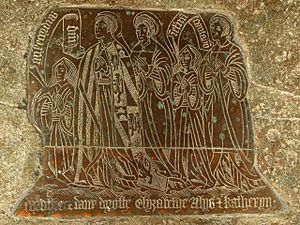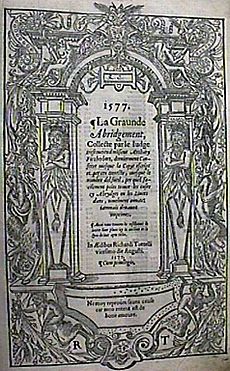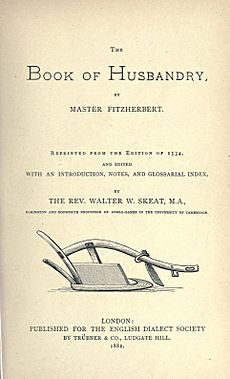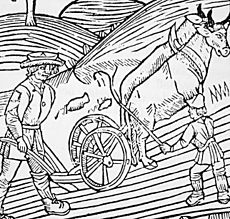Anthony Fitzherbert facts for kids
Quick facts for kids
Anthony Fitzherbert
|
|
|---|---|

Monumental brass in chancel floor of Norbury Church to Anthony Fitzherbert and his wife. The foremost standing lady wears a mantle on which are shown the following arms: Gules, three lions rampant or (FitzHerbert of Tissington) quartering: Argent, a chief vairy gules and or overall a bend sable (FitzHerbert of Swynnerton)
|
|
| Born | 1470 Norbury
|
| Died | 27 May 1538 |
| Resting place | Norbury |
| Nationality | English |
| Occupation | Judge |
| Spouse(s) |
|
| Parent(s) | Ralph Fitzherbert and Elizabeth Marshall |
Sir Anthony Fitzherbert (born 1470, died 27 May 1538) was an important English judge, a smart scholar, and a writer of legal books. He is best known for his book about English law called New Natura Brevium, which came out in 1534.
Sir Anthony Fitzherbert: A Life in Law
Early Life and Education
Anthony Fitzherbert was the sixth son of Ralph Fitzherbert and Elizabeth Marshall. His family lived in Norbury, Derbyshire. Since his older brothers died young, Anthony took over his father's role as the Lord of the manor of Norbury. This family estate had been theirs since 1125.
We don't know exactly where he went to university, but some records suggest he might have studied at Oxford. He also trained in law at one of the famous "Inns of Court," which were like special schools for lawyers. He is listed as a reader at Gray's Inn, a well-known legal society.
Rising Through the Ranks
Anthony Fitzherbert became a serjeant-at-law on November 18, 1510. This was a very high rank for a lawyer. Six years later, he was appointed the king's serjeant, meaning he worked directly for the king.
In 1514, he published his first major legal book, La Graunde Abridgement. By 1522, he was made a judge of common pleas and was also knighted, earning the title "Sir Anthony." Even with these new honors, he kept writing.
Important Works and Royal Duties
In 1523, Sir Anthony published three more important books:
- Diversité de courtz et leur jurisdictions (about different courts and their powers).
- The Boke of Husbandrie (about farming).
- The Boke of Surveyinge and Improvements (combining law and farming).
All these books were printed many times. People trusted Sir Anthony because he was honest and skilled.
In 1524, he was sent to Ireland on a special mission for the king. He also helped manage the estate of Archbishop Warham after the Archbishop passed away. In 1529, when Cardinal Wolsey lost power, Sir Anthony was chosen to help hear court cases in his place. He also signed the papers that led to Wolsey's impeachment.
As a judge, he had to take part in the trials of important figures like Fisher, More, and Haile. However, he did not agree with King Henry VIII's decisions about the church, especially taking over church lands. He even made his children promise never to buy or accept any land that used to belong to monasteries.
In 1534, he published La Novelle Natura Brevium, another very important legal book. His last works, L'Office et Auctoryté des justices de peas (1538) and The Offices of Sheryffes, Bailliffes, Escheatours, Constables, and Coroners, were the first complete guides on these topics.
Family Life
Sir Anthony Fitzherbert was married twice. His first wife, Dorothy Willoughby, did not have any children. His second wife, Matilda Cotton, gave him a large family. His descendants continued to live at Norbury and remained Catholic.
Sir Anthony Fitzherbert's Books
La Graunde Abridgement (1514)
In 1514, Fitzherbert published La Graunde Abridgement. This book was a huge collection of legal cases taken from old court records called the Year Books. It was the first time someone tried to put together a complete summary of English law.
This book was very popular and was reprinted many times. It became the foundation for all later summaries of English law. He also helped publish an edition of "Magna charta cum diversis aliis statutis" (1519), which included the famous Magna Carta and other laws.
La Novelle Natura Brevium (1534)
La Novelle Natura Brevium was another important book on English law written by Fitzherbert. People described it as an "exact work, exquisitely penned." Even today, judges around the world still refer to it. It gives a great look at the rules of common law in the 1500s. It remained one of the most important English law books until the late 1700s.
In this book, Fitzherbert explained important legal ideas. For example, he wrote that if a blacksmith accidentally hurts your horse with a nail, you can take legal action against him. He said this is because "it is the duty of every artificer to exercise his art rightly and truly as he ought." This means people who do skilled work have a duty to do it well.
Boke of Husbandry (1523/34)
Fitzherbert's Boke of Husbandry, published in 1523 or 1534, is a classic book about English farming. It is full of smart observations and wise advice, written in a strong and sometimes funny style. Fitzherbert wrote that "every man is captain of his own soul," a phrase that reminds us to take charge of our own lives.
The book gives advice on how to:
- Drain wet land.
- Clear and fence off a farm.
- Improve soil by adding compost and manure.
He strongly suggested using lime and marl (types of soil additives) and letting fields rest (fallowing). He also advised landlords to give leases to farmers who would fence their farms and divide them into smaller areas. He explained that:
- If an acre of land is worth sixpence before it is enclosed, it will be worth eightpence when it is enclosed, by reason of the compost and dunging of the cattle.
Another benefit was that fences would protect crops without needing someone to watch the animals. Many people believe that farming in England improved greatly after this book came out in 1534.
The book isn't just about farming. It also talks about:
- Breeding horses.
- Selling wood and timber.
- Grafting trees.
- Being careful with money (avoiding being wasteful).
- Thoughts on gambling and what "riches" truly means.
- Practical advice on religion.
This shows that the book was written by a country gentleman who knew a lot about land, animals, and the world around him, not just a farmer who worked the land every day.
The Boke of Surveying and Improvements (1523/39)
While The Boke of Husbandry described farming practices, The Boke of Surveying and Improvements taught readers about the old feudal system as it was changing. The very first editions of these books from 1523 are quite rare. The 1523 Boke of Husbandry is famous for its title page engraving, which shows two oxen pulling a plough.
Fitzherbert wrote from his own experience of over forty years. Many experts say that much of his advice on growing crops is still useful today, even centuries later. His ideas on sheep and horses were also very accurate. He even talked about animal diseases and the benefits of mixing different types of animals in the same pasture.
The book also highlighted the advantages of enclosing land with fences and hedges. It gave detailed instructions on how to plant and care for hedges and trees. There's also advice "for a young gentleman that intends to thrive" and a "prologue for the wife's occupation."
For example, he suggested that a wife should "make her husband and herself some clothes" and use "the locks of the sheep" to make blankets or covers. He also wrote that a wife's job included:
- "... winnowing all manner of corn, to make malt, to wash and wring, to make hay, shear corn, and, in time of need, to help her husband to fill the muck-wagon or dung cart, drive the plough, to load hay, corn, and such other. And to go or ride to the market, to sell butter, cheese, milk, eggs, chickens, capons, hens, pigs, geese, and all manner of corn."
The rest of the book offers useful advice on being hardworking and saving money, ending with many religious messages common for that time.
 | Audre Lorde |
 | John Berry Meachum |
 | Ferdinand Lee Barnett |




